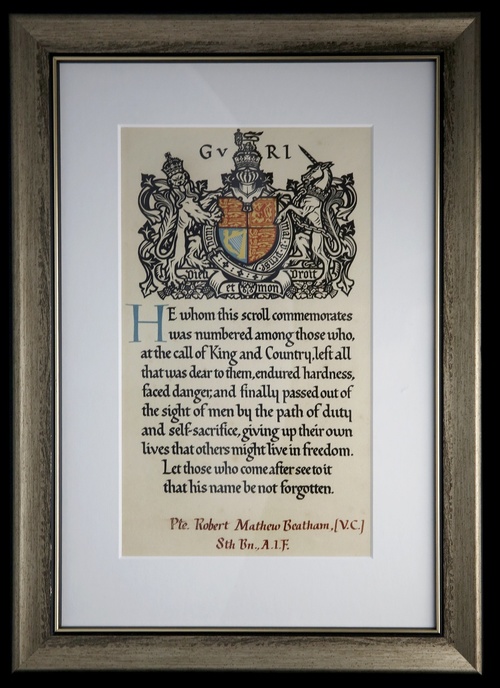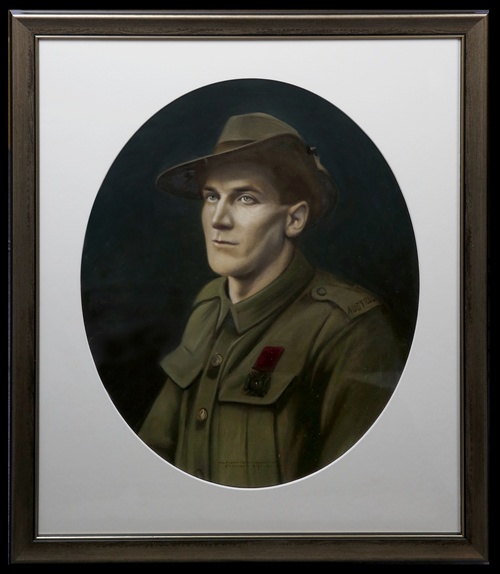Auction: 17002 - Orders, Decorations and Medals
Lot: 169
Sold by Order of a Direct Descendant
'For most conspicuous bravery and self-sacrifice during the attack north of Rosieres, east of Amiens, on 9th August 1918. When the advance was held up by heavy machine-gun fire, Private Beatham dashed forward, and, assisted by one man, bombed and fought the crews of four enemy machine-guns, killing ten of them and capturing ten others, thus facilitating the advance and saving many casualties. When the final objective was reached, although previously wounded, he again dashed forward and bombed a machine-gun, being riddled with bullets and killed in doing so. The valour displayed by this gallant soldier inspired all ranks in a wonderful manner.'
The London Gazette 13 December 1918, refers.
The Memorial Scroll and family memorial portrait appertaining to Private R. M. Beatham, 8th Battalion, Australian Imperial Force, who won an outstanding posthumous V.C. at the Battle of Amiens in August 1918
Buckingham Palace illuminated Memorial Parchment Scroll, named to 'Pte. Robert Mathew Beatham, [V.C.], 8th Bn., A. I. F.', in good condition, together with an oil overpainted family memorial portrait, 400mm x 330mm, in uniform and wearing the V.C., in an oval mount, both glazed and framed in matching style
'We have been in hotter holes since then but never has the Battalion suffered under intense shellfire for such long periods and with such little movement. The casualty lists bear this out. The conditions were vile. The weather was hot and everyone fully occupied on other tasks, the dead lay unburied for weeks and the stench was frightful. To come through a period such as this and then go on fighting is evidence of the temper of the British armies in general and of our unit in particular. Under the heading of the First Battle of the Somme is told the story of our first and heaviest try out'
Mouquet Farm, 1916 The 21st Battalion, A.I.F. History refers.
The Great War campaign group of three awarded to Private W. H. Beatham, 21st Battalion, Australian Imperial Force, captured at the Battle of Mouquet Farm
1914-15 Star (337 Pte. W. H. Beatham, 21 Bn. A.I.F.); British War and Victory Medals 1914-20 (337 Pte. W. H. Beatham, 21 Bn. A.I.F.), light contact marks, very fine, together with the recipient's Anzac Memorial Medal, bronze, officially impressed 'W. H. Beatham', in the case of issue (Lot)
Robert Mathew Beatham was born at Glassonby, Cumberland in 1894, one of nine sons of John and Elizabeth Beatham. Together with his brother Walter, he emigrated to Australia whilst still a teenager and worked as a labourer at Geelong, Victoria. Enlisting in the 8th Battalion, Australian Imperial Force on 8 January 1915, he was embarked for France. Wounded in August 1916 and again in October 1917, he won his Victoria Cross during the great advance which began on 8 August 1918 - Germany's 'Black Day'. On the 9th, the 1st and 2nd Australian Division, thrusting out a northern flank for Canadian and French units that included cavalry, advanced against enemy held high ground near Lihons. The 7th and 8th Battalions started near Harbonnières and soon came under enemy air attack and heavy shelling from Lihons. One by one the supporting tanks were knocked out, only increasing the German will to resist. The 8th, nevertheless, pressed forward up the hill which lay on its designated Battalion front until held up by the four enemy machine-guns mentioned in his V.C. citation. With the gallant assistance of Lance-Corporal W. G. Nottingham, himself the winner of the D.C.M. and M.M., Beatham neutralised the deadly posts, and by nightfall the Battalion was within striking distance of the objective on the left but still some way short of it on the right. Finally, after a further three days of vicious fighting, the Battalion forced its way over the high ground and accomplished its task. However, just as Beatham was nearing the final objective, all but at the point of victory, he was cut down and killed by enemy fire on 11 August 1918. He is buried in Heath Cemetery, Harbonnières.
Walter Henry Beatham emigrated to Australia with Robert and also worked as labourer in Geelong, Victoria. Following the outbreak of hostilities in August 1914, he enlisted in the 21st Battalion, Australian Imperial Force and was embarked for Egypt in June 1915. He subsequently landed at Anzac Cove, Gallipoli, where he served from September to December 1915. Next embarked for France - in March 1916 - Beatham was captured in the bloody Battle of Mouquet Farm. For well over a month, the 1st, 2nd and 4th Australian Divisions attacked the imposing German stronghold of near Pozieres, in the valley of the Ancre River. The offensive cost of over 11,000 casualties, with Beatham confirmed as a Prisoner of War on 7 October 1916. Interned at the Reserve Lazarett Bergkaserne Camp, Munster, he hatched an escape during the summer of 1918, a post card reference in his service record stating: 'I escaped from Det. 13 but have been returned. I have been a while in prison. I am in the best of health.' Repatriated to Hull on 5 December 1918, he returned home to his widowed mother: he was sole survivor of five brothers who had served during the Great War.
Note: The Victoria Cross awarded to Private R. M. Beatham was sold in the rooms of Spink Australia, March 1999.
Subject to 20% VAT on Buyer’s Premium. For more information please view Terms and Conditions for Buyers.
Sold for
£2,500







